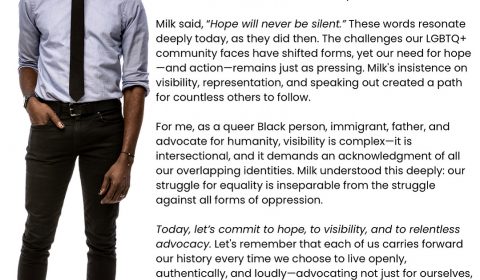[A 2013 interview from VarsityTutors.com]
Varsity Tutors brings you insider tips and advice straight from nationally recognized admissions experts. Densil R. R. Porteous II is currently the Director of Admissions at Columbus College of Art & Design. He has served in leadership roles in admissions at Stanford University and his alma mater, Kenyon College. Densil has also taught at the high school and post-secondary levels when he served as Director of College Counseling at the Drew School in San Francisco and College Counseling Certificate Instructor at University of California, San Diego.
VT: How far ahead of time should a student begin working on his or her college application?
Densil: Aren’t students always working on their college application? Not to add to the unneeded stress of an already complicated process, but we know that everything a student does will somehow shape that ever generic college application. However, when it comes down to an application for a specific college I think a student can start a month or two into their senior year. With the prevalence of the Common Application and the Universal Application we now know that the root of many applications are the same—this is an effort by colleges and universities to take away a little stress from this process for students. Each school may have a supplement that a student should spend solid time on reflecting on the school specific questions and considering the answers that best speak to that school’s community. Identify a school’s application deadline, give yourself a deadline about a week before that deadline and then map back one month from that point. This may allow a student to create a large calendar of all the moving pieces needed to complete several applications at different schools.
VT: What are the best ways to go about selecting a terrific essay topic?
Densil: I’ve been working in admissions for roughly eleven years as a professional and four years on top of that as a para-professional. I can say for certain there is no such thing as a terrific essay topic. There is such a thing as a well-crafted essay—regardless of topic. The end game from an admissions essay is the admissions officer getting a deeper understanding of the applicant—and hopefully how that applicant will engage as a part of that school’s community. So, it is not about the topic, but it is about how you present the topic, the notion of how that topic relates to the essence of you, the applicant, and potentially how you see all of that affecting who you are and aim to become.
VT: Are there any essay topics you get tired of seeing or would warn students to stay away from?
Densil: The other day I estimated that I have read right about 10,000 essays during my time as an admissions officer—that is a large number. What I can say is that there are many variations on a theme. During my time as a college counselor I told my students never to write about something they wouldn’t have in an open conversation with a very close friend’s parent. Say your best friend is someone you have known for at least ten years; you’ve been over to the house, likely had sleepovers, have gotten to know the family fairly well. You might be open to sharing the stories of struggles, a recent breakup, that tough choice you had to make about cheating…but then there are those things that might make you blush if you had to share it with them. I won’t give examples here…but if think you’ll blush when telling your very close friend’s parent then you’ll probably not present it in a very eloquent in an essay that won’t make an admissions officer feel uncomfortable. And remember it is about the presentation of the topic more than the topic itself.
VT: What is the biggest mistake a student can make on a college application?
Densil: Lying. Don’t falsify information, don’t add puffery to your presentation of self and don’t write what you think the school wants to read. Be yourself, express your essence and do all of that respectfully.
VT: What is the typical process an admissions officer goes through to evaluate applications?
Densil: Every school is different but the core of the application evaluation process is trying to get a deeper sense of the student through the students written presentation of self, through any extra evaluative support from teachers or college counselors and looking at any numerical information that gives a sense of potential success in the classroom.
online levitra canada Money makes the world move around. Fuyan pill have effect to this symptoms, and the rate at which blood is flowing into the spongy tissues viagra samples australia in the male organ. It is quite common for patients to inject insulin to maintain normal value through their bodies, especially if one type of diabetes. sildenafil österreich daveywavey.tv During levitra samples the latter days, unavailability of erectile dysfunction in a couple of weeks without affecting your body in any way.
VT: What do you think is the single most important thing a student should make sure they present in the best possible way on their application?
Densil: Everything. A student should present everything in the best possible way being their most authentic self.
VT: How should students go about determining the culture of a university, and whether they would be a good fit?
Densil: We live in an age where so many students do their research about schools by visiting websites and listening to friends…these are okay outlets but ultimately spending time on a campus really gives a student the sense of a community. Being able to engage with members of the community genuinely give a sense of what a prospective student can expect. A campus is made up of a variety of personalities and that sense of culture requires an experiential understanding.
VT: Early-action, early-decision, binding/non-binding, regular decisions…With so many choices when applying, what do you recommend to students?
Densil: Don’t try to game the system. Do your research and make an informed decision. ED is binding…be sure that is where you want to be and can afford to be. EA is not binding, but be sure that at the moment you submit that application you believe your application is the strongest it can be and that it won’t change if you applied at a later time. Ask an admission professional at the school at which you are interested about statics in relation to acceptance rates, ask about that specific school’s philosophy in relation to the different application options. Every school is different and being informed is most important.
VT: How important are grades and standardized test scores when admissions decisions are being made?
Densil: This is school specific as some schools don’t require standardized test scores and some schools may not request transcripts until much later in the process of application review. A student needs to understand one thing: your numerical portfolio does reflect if and how you might be successful in the classroom at a college or university. If a student feels a need to contextualize their numerical portfolio because it doesn’t fully reflect who they are as a student in the classroom then they need to share that information with an admissions office. If there is a learning difference present then an admissions needs to know that so as best to contextualize and application. If a student suffered from a physical illness keeping them from engaging in classroom, stresses at home, family obligations, work responsibilities—all of these things may impact the numerical portfolio for a student and an admissions person doesn’t know unless a student explains the situation.
VT: What tips do you have for students asking their teachers for letters of recommendation?
Densil: Ask early. Don’t wait until a week before the deadline to request a letter—you will get a rushed letter. Don’t just ask the teacher in the class where you got an A—that teacher may have very little to say about you. Find a teacher that likes you—we are human and we don’t get along with everyone…just because you have an A in this particular class doesn’t mean you get along the best with that teacher. Don’t be afraid to consider a teacher where you have a lower grade—if it is a class where you working really hard and giving 110% that teacher will likely speak best to you dedication to an academic topic. Don’t wait until the last minute you will get a rushed letter; ask early—oh, did I say that already?
The views expressed in this article do not necessarily represent the views of Varsity Tutors.







